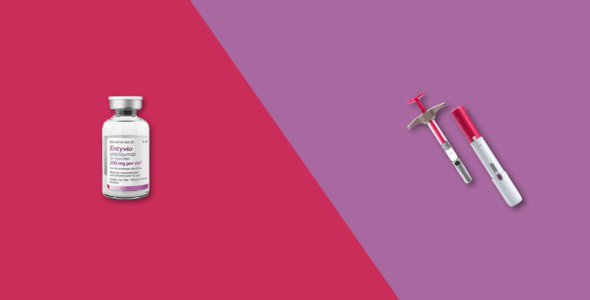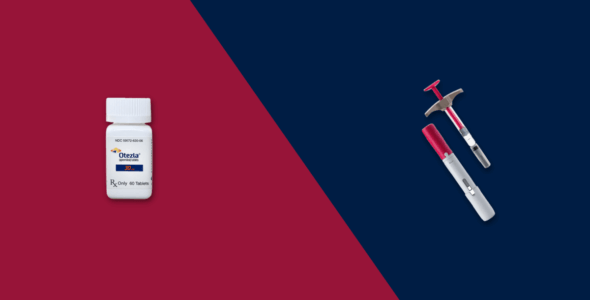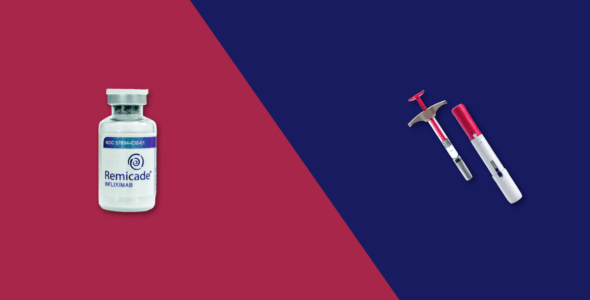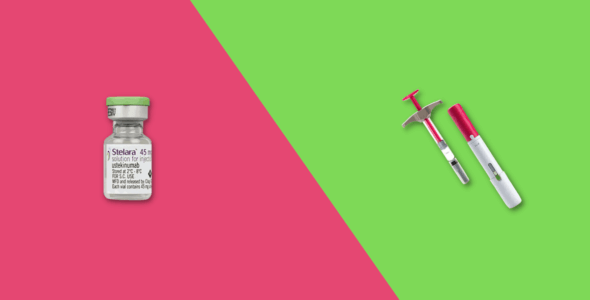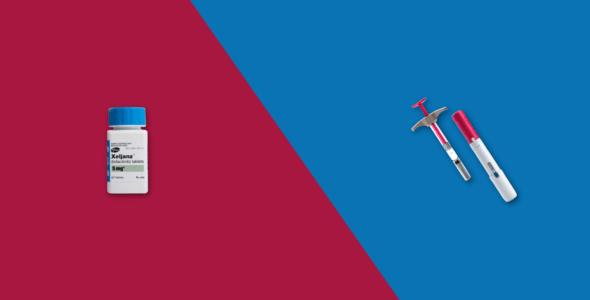Humira and alcohol: can they be used together?
Table of contents
Alcohol and prescription drugs can interact harmfully even if they are not taken at the same time. You may be wondering if it is safe to take Humira and drink alcohol. There is no solid scientific evidence against this, but health professionals strongly advise not to consume alcohol when using Humira due to the risk of liver damage. To learn more about how Humira works and the dangers of combining it with alcohol read on.
What is Humira?
Humira (adalimumab) is an injectable prescription drug manufactured by AbbVie and is FDA-approved. It is used to treat autoimmune conditions like rheumatoid arthritis, Crohn’s disease, and psoriasis. The medication is a class of biologic medications known as tumor necrosis factor (TNF) blockers.
What is a TNF blocker?
TNF is a protein in the body that can cause inflammation. Normally excess TNF in the blood is naturally controlled. But, in people with certain immune conditions, TNF levels are higher leading to excessive inflammation. Inflammation is harmful to your body when it is out of control e.g. severe pain and swelling.
Humira causes a reaction in your immune system by binding to TNF and preventing it from triggering the inflammatory reaction. Other TNF blockers that are FDA approved include:
What is Humira used for?
Humira can be used used to treat:
- Rheumatoid arthritis
- Ankylosing spondylitis
- Crohn’s disease
- Ulcerative colitis
- Plaque psoriasis
- Polyarticular juvenile idiopathic arthritis
- Psoriatic arthritis
- Hidradenitis suppurativa
- Uveitis
Side effects of Humira
Humira is an effective treatment but like all prescription medications, it can cause side effects. Side effects should always be discussed with healthcare professionals.
People may experience the following common side effects after taking Humira:
- Injection site reactions e.g. bruising, or itching
- Joint pain
- Weight loss
- Shortness of breath
- Coughing
- Diarrhea
- Fatigue
- Stomach upset
Examples of the most serious and less common side effects relating to taking Humira include:
- Liver damage/liver problems – yellowing of the eyes or skin, right-sided abdominal pain, vomiting, and fatigue
- Nervous system problems – numbness and tingling in hands and feet, vision changes, and dizziness
- Allergic reactions – ranging from difficulty breathing to swelling of the eyes, lips, and face
- Immune system changes – lupus-like reaction to including symptoms such as joint pain, rash on cheeks or arms, chest discomfort, or shortness of breath
- Increased risks for infections – these include tuberculosis and other opportunistic infections due to viral, bacterial, or fungal illnesses
Live vaccines such as yellow fever, BCG, cholera, typhoid, varicella should never be given to Humira patients. There is also an increase in the risk of serious infections when Humira is taken with abatacept (Orencia) and anakinra (Kineret)
Can you drink alcohol with Humira?
Risk of liver damage
The main concern about alcohol and Humira use is damage to the liver. However, there is currently limited research on the safety of Humira and alcohol when taken together. This does not mean the combination is safe.
TNF inhibitor use alone can increase liver enzymes. When alcohol is added Humira may not work as effectively, or the drug is released into the system in higher doses. Either way, this may lead to complications and risk of severe liver injury.
Alcohol alone can also damage the liver. Because the liver breaks down alcohol, doctors believe it is possible that drinking alcohol could increase the risk of liver damage. However, scientists need to do more research.
While there is a lot of conflicting information, what researchers know for sure is that alcohol, autoimmune diseases, and TNF inhibitors can damage the liver on their own and when taken in combination. In addition, other medications used to treat and manage pain associated with autoimmune conditions cause organ damage.
Additionally, many patients who take Humira are also using methotrexate to treat their condition, particularly with rheumatoid arthritis. Most healthcare professionals recommend that people taking methotrexate limit or avoid alcohol consumption even in the absence of liver disease.
Commonly prescribed medications used with Humira
Humira is commonly used with a class of medications known as disease-modifying antirheumatic drugs (DMARDs).
Examples of DMARDs include:
- methotrexate (Otrexup)
- leflunomide (Arava)
- hydroxychloroquine (Plaquenil)
- sulfasalazine (Azulfidine)
Depending on the condition it’s being used to treat, Humira may or may not be used with other drugs.
Many patients who use Humira also use
- Methotrexate to help control rheumatoid arthritis symptoms
- Topical corticosteroids for the treatment of plaque psoriasis
- Nonsteroidal anti-inflammatory drugs (NSAIDs) for treatment of hidradenitis suppurativa
Possible alcohol drug interactions can occur with other medicines such as methotrexate, NSAIDs, and corticosteroids like prednisone (Deltasone). For example, methotrexate is broken down in the liver. In general, long-term use of methotrexate can also lead to liver toxicity. Most health care providers recommend that patients avoid or limit alcohol consumption when using methotrexate.
Final word
Overindulging in alcohol frequently puts you at risk for chronic liver damage and other health-related risks. When Humira is combined with excessive alcohol consumption, the risk for permanent organ damage is potentially increased. You should openly discuss your drinking habits and the importance of social life by balancing your condition with your healthcare provider. They can help you understand the risks of drinking alcohol based on your specific health history. This content is not intended to be a substitute for professional medical advice.
Medically reviewed
A medical professional has reviewed this article.


Jamie Winn, PharmD
Jamie Winn, PharmD
Dr. Jamie Winn received his Doctor of Pharmacy in 2002 from the University of South Carolina College of Pharmacy, Columbia, SC. Jamie is a medical reviewer for NiceRx.






